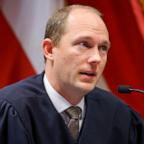After 18 Miscarriages 'Miracle' Baby Born
Angie Baker would not give up on her dream of motherhood.
LONDON, Feb. 19, 2010— -- Angie Baker would not give up on her dream of becoming a mother.
Still in her 30s, Baker had already suffered through 18 miscarriages.
The would-be-mom and her partner, Lee Gibson, 31, a martial arts instructor, live in the town of Peacehaven, not far from the seaside resort of Brighton, England.
They had talked about adoption before they found their way to the offices of Dr. Hassan Shehata Epsom, an expert on miscarriages at St. Helier University Hospital, in Sutton, just south of London.
"I was shocked when I saw that number," Shehata recalls. "A lot of women give up after five or six miscarriages. Angie is exceptional."
She met Shehata just in time to make her dream come true.
Baker was otherwise healthy, Shehata says, despite her many miscarriages, and she had conceived naturally each time.
"She said to me, I have a belief that I will have a baby one day," he says. "She said as long as you believe in me and want to help me, I am happy to work with you."
Shehata helped pioneer a relatively simple and low-cost treatment for women who have had multiple miscarriages.
He emphasized there are multiple reasons for miscarriage, and the treatment he used is not a blanket solution. But he did believe that Angie would be a good candidate.
"By the time she came to see me, she had had everything done," he said. At one time or another Angie had been prescribed aspirin, high doses of folic acid, vitamin B and calcium. Each time she became pregnant, she lost the baby by eight or nine weeks. Often, she was told the baby had stopped growing around the six-week point.
Shehata immediately tested Angie's NK (natural killer) cells. NK cells are a subtype of white blood cells. They protect the body from foreign viruses. In the female body, the highest count of NK cells are in the endometrium, the lining of the womb.
"In a woman with a high NK count," Shehata explained, "it seems they wrongly define the pregnancy as a foreign body and attack."
Shehata believed Angie's own body could be rejecting the baby she dreamed of having over and over again.




